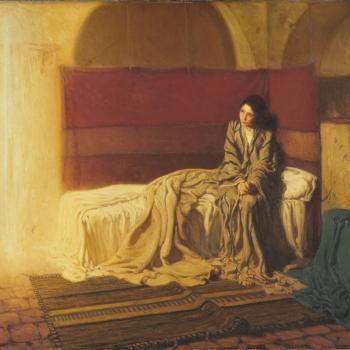“Savior of the Nations, Comes” by Holy City Hymns from Advent No. 2 (2014)
Savior of the nations, come,
Virgin’s Son, here make Thy home.
Marvel now, O heaven and earth,
That the Lord chose such a birth.
Not by human flesh and blood,
By the Spirit of our God,
Was the Word of God made flesh
Woman’s Offspring, pure and fresh.He will come, he will come,
He will come down and rescue us.Brightly doth Thy manger shine,
Glorious is its light divine.
Let not sin conceal this light,
Ever be our faith thus bright.He will come, he will come,
He will come down and rescue us.Now the Father’s only Son
Have o’er sin the victory won.
Boundless shall Thy kingdom be,
When shall we its glories see?Jesus come, Jesus come,
Jesus come down and rescue us.Jesus come, Jesus come,
Jesus come down and rescue us.He will come, he will come,
He will come down and rescue us.
HISTORY OF THE HYMN
This is the third installment of a series on the great hymns of Advent. To learn more about Advent, read the introductory post: On Advent: What It Is & Why You Need It.
Part 1 on the hymns of Advent can be read here: O Come, O Come Emmanuel.
Part 2 can be read here: A Hymn of Advent.
Much like the hymn of the first week of Advent, this week’s hymn has a storied past. While O Come, O Come Emmanuel dated back to the O Antiphons from the 12th century, Savior of the Nations, Come dates back to the late 4th century.
The original version of Savior of the Nations, Come was St. Ambrose’s Veni, Redemptor Gentium composed in the late fourth century. Many ancient hymns are erroneously attributed but this seems to be one of the few that was almost certainly penned by Ambrose (340ish-390CE). St. Augustine (354-430CE) cites a verse of the hymn, making reference to Ambrose, his mentor, as the author of the hymn and Pope Celestine (??-432CE) quotes the hymn and attributes it to Ambrose in one of his sermons. [1]
Over a millennium later, Martin Luther “translated” Ambrose’s text into German in 1524CE. Luther’s version was titled Nun Komm, der Heiden Heiland (Now Come, Savior of the Gentiles). It maintains the essence of Ambrose’s hymn though it reflects its fair share of German-poetical-linguistic influence. This hymn, among many others, helps to account for Luther’s tremendous influence. Luther was so influential because of his employment of church music (often mixed with local folk tunes and melodies). Songs he wrote or adapted helped fuel the Protestant Reformation as it opened the door to influencing not only the head but the heart and imagination as well.
Some two hundred years later, the greatest musical genius to walk the earth (IMHO), Johann Sebastian Bach ensured that Ambrose and Luther’s hymn would live on. Bach incorporated Luther’s lyrics into his own canon and thus into the church (and broader cultural ) repertoire eternally. In Leipzig in 1714, Bach composed the cantata Nun Komm, der Heiden Heiland and saw fit that this song would be played on the first Sunday of Advent, ensuring its legacy.
Finally, a 19th century American pastor and professor by the name of William M. Reynolds translated Luther’s German version of the hymn into English in 1860. The version by Holy City Hymns is a slightly amended and re-arranged rendition of the Reynold’s version.
REFLECTIONS ON THE HYMN
First, a note about this version of the hymn. I only recently discovered this artist collective Holy City Hymns. They are “a liturgical music collective based in Charleston, SC.” [2] They’re a great bunch from a great city. I discovered the Holy City Hymn collective by searching for a good modern version of this ancient hymn and they were kind enough to post it on YouTube for me so I can showcase it on the blog… thanks y’all!
This is by far my favorite rendition of the hymn out there on the interwebs. I love this version because it’s simple and elegant. It’s stripped down and not over-produced. Some straightforward vocals, a little acoustic guitar, some lap steel and a spot or two of percussion (is that a mandolin in there?) and we’re golden. Good stuff, indeed.
Now onto some theological reflections on the hymn.
The second and third stanzas focus on the Incarnation of Jesus. Ambrose probably wrote this as a means of theological formation of his congregation over and against Arianism, a heresy he combatted. Arianism is the erroneous belief about the relationship between God the Father and God the Son. Arians believe(d) that the Son of God, Jesus, was not eternally pre-existent with God the Father and so was created by him and therefore subordinate to Him. The Nicene Creed was developed in response to the Arian heresy and Ambrose’s hymn was clearly inspired, at least in part, by the theological vision of the Nicene Creed. You can hear the echoes of the creed throughout the hymn, especially the section relating specifically to Jesus:
We believe in one Lord, Jesus Christ,
the only son of God,
eternally begotten of the Father,
God from God, Light from Light,
Begotten, not made,
Of one Being with the Father
Through Him all things were made.
For us and for our salvation he came down from heaven:
By the power of the Holy Spirit
he became incarnate from the Virgin Mary
And was made man…
The first stanza, in addition to describing the Incarnation, gives insight into the vision of God’s grand plan of salvation. The opening line, “Savior of the nations, come” is an indication that although Jesus the Messiah came to and through the Israel, God’s chosen people, God’s plan for salvation was not for Israel as opposed to the other nations but for the sake of the nations. God’s plan was always that He would be His Son would be the Savior of the nations, not just of ethnic Israel.
We see this when God calls Abraham, the patriarch of His people:
Now the LORD said to Abram, “Go from your country and your kindred and your father’s house to the land that I will show you. And I will make of you a great nation, and I will bless you and make your name great, so that you will be a blessing. I will bless those who bless you, and him who dishonors you I will curse, and in you all the families of the earth shall be blessed.” (Gen 12:1-3)
God chose Abraham and his descendants and chose to bless them in order that they would be a blessing. Through God’s chosen people, all the nations shall be blessed: “in you all the families of the earth shall be blessed.”
God’s intention all along was that when the Messiah comes, it would not be for Israel at the exclusion of the nations but for the nations through Israel. This is perhaps most clear in the prophet Isaiah. About the redemption of Israel and return from exile, Isaiah prophesies:
And now the LORD says, he who formed me from the womb to be his servant, to bring Jacob back to him;
and that Israel might be gathered to him— for I am honored in the eyes of the LORD, and my God has become my strength— he says: “It is too light a thing that you should be my servant to raise up the tribes of Jacob and to bring back the preserved of Israel; I will make you as a light for the nations, that my salvation may reach to the end of the earth.” (Isa 49:5-6).
Isaiah makes very clear that Lord called blesses His people in order that they might be a blessing. He says that God calls Israel to be a light to the nations (Isa 42:6). This would ultimately take place through the work of the Israel’s Messiah. Jesus the Messiah came as the Savior of Israel and the savior of the nations through Israel.
Ambrose’s hymn concludes with a fantastic Trinitarian doxology (this verse is omitted from many English versions) but appears in Luther and Bach’s. Advent beckons us to remember two things. First, that Jesus came to demonstrate His love and inaugurate the kingdom. Second, we are to long for his second advent when He will bring justice and peace and ultimately establish His kingdom. As we pine and pray, Advent reminds us that we ought to do so with a posture of praise. The fitting response to God’s love is praise: “Praise the LORD, all nations! Extol him, all peoples! For great is his steadfast love toward us, and the faithfulness of the LORD endures forever. Praise the LORD!” (Psalm 117). In step with the psalmist, Ambrose also calls us to praise:
Praise to God the Father sing,
Praise to God the Son, our King,
Praise to God the Spirit be
Ever and eternally.
[1] Nicene and Post-Nicene Fathers, second series, vol X on Ambrose, xxii.
[2] Self-description from their website: Holy City Hymns.










